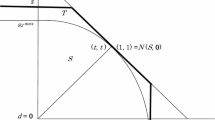Abstract
In this paper, we introduce a new two-person bargaining solution, which we call iterated Kalai–Smorodinsky–Nash compromise (IKSNC). For its characterization, we present an axiom called \(\varGamma \)-Decomposability which is satisfied by any solution that is decomposable with respect to a given reference solution \(\varGamma \). We show that the IKSNC solution is uniquely characterized by \(\varGamma \)-Decomposability whenever \(\varGamma \) satisfies the standard axioms of Independence of Equivalent Utility Representations and Symmetry, along with three additional axioms, namely Restricted Monotonicity of Individually Best Extensions, Weak Independence of Irrelevant Alternatives, and Weak Pareto Optimality under Symmetry.

Similar content being viewed by others
Notes
The results of Rachmilevitch (2014) are independent from the previous characterization results since KSNR neither implies nor is implied by the set of standard axioms, involving IEUR, SY, and WPO.
This axiom of Kalai (1977) requires that for any two 0-normalized bargaining problems S and \(S'\) with \(S'\supseteq S\), the solution on \(S'\) can be obtained by first calculating the solution on S and then taking it to be the starting point for the distribution of the utilities in \(S'\) to calculate the solution on this normalized set.
Given two vectors x and y in \({\mathbb {R}}^2_+\), \(x > y\) means \(x_i > y_i\) for \(i=1,2\) and \(x \ge y\) means \(x_i \ge y_i\) for \(i=1,2\).
Any game \((S,d) \in \Sigma ^2\) is said to be a hyperplane game if the Pareto frontier of the set \(IR(S,d)=\{x\in S|x\ge d\}\) is a line segment in \(\mathfrak {R}^2_+\).
Thomson (1983) showed that in the n-person case the Kalai–Smorodinsky solution turns out to be the only solution that possesses Anonymity (AN), Continuity (CONT), IEUR, Monotonicity With Respect to Changes in the Number of Agents (MON), and WPO. Of these axioms, IEUR and WPO are generalizations of the former conditions used by Kalai and Smorodinsky (1975) for the two-person case. The axiom AN is a strengthening of SY, and it requires that not only the names of the agents in a given group do not matter but also that any other group of agents of the same size would reach the same bargaining outcome. CONT implores that a small change in the bargaining set causes only a small change in the bargaining outcome. Finally, MON says that if the expansion of a group of agents requires a sacrifice to support the entrants, then every incumbent must contribute. The Nash solution satisfies AN, CONT, IEUR, and WPO; but it does not satisfy MON as directly shown by Thomson and Lensberg (1989, pp. 41–42).
References
Kalai, E., Smorodinsky, M.: Other solutions to Nash’s bargaining problem. Econometrica 43, 513–518 (1975)
Kalai, E.: Proportional solutions to bargaining situations: interpersonal utility comparisons. Econometrica 45, 1623–1630 (1977)
Nash, J.F.: The bargaining problem. Econometrica 28, 155–162 (1950)
Rachmilevitch, S.: Gradual negotiations and proportional solutions. Oper. Res. Lett. 40, 459–461 (2012)
Rachmilevitch, S.: Bridging the gap between the Nash and Kalai–Smorodinsky bargaining solutions. In: Petrosyan, L., Zenkevich, N. (eds.) Contributions to Game Theory and Management, vol. 7, pp. 300–312. St. Petersburg University, Saint Petersburg (2014)
Raiffa, H.: Arbitration schemes for generalized two-person games. In: Kuhn, H.W., Tucker, A.W. (eds.) Contributions to the Theory of Games II, Annals of Mathematics Studies, No. 28, pp. 361–387. Princeton University Press, Princeton (1953)
Roth, A.E.: An impossibility result concerning n-person bargaining games. Int. J. Game Theory 8, 129–132 (1979)
Saglam, I.: A simple axiomatization of the egalitarian solution. Int. Game Theory Rev. 16, 1450008-1 (2014)
Salonen, H.: Decomposable solutions for n-person bargaining games. Eur. J. Polit. Econ. 4, 333–347 (1988)
Thomson, W.: The fair division of a fixed supply among a growing population. Math. Oper. Res. 8, 319–326 (1983)
Thomson, W., Lensberg, T.: Axiomatic Theory of Bargaining with a Variable Number of Agents. Cambridge University Press, Cambridge (1989)
Trockel, W.: Robustness of intermediate agreements for the discrete Raiffa solution. Games Econ. Behav. 85, 32–36 (2014)
Trockel, W.: Axiomatization of the discrete Raiffa solution. Econ. Theory Bull. 3, 9–17 (2015)
Author information
Authors and Affiliations
Corresponding author
Additional information
The author is grateful to an anonymous reviewer for many helpful remarks and suggestions that have significantly improved the paper. The usual disclaimer applies.
Rights and permissions
About this article
Cite this article
Saglam, I. Iterated Kalai–Smorodinsky–Nash compromise. Decisions Econ Finan 40, 335–349 (2017). https://doi.org/10.1007/s10203-017-0203-y
Received:
Accepted:
Published:
Issue Date:
DOI: https://doi.org/10.1007/s10203-017-0203-y




